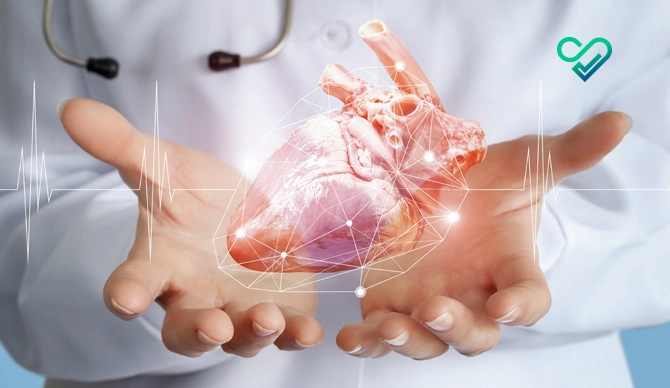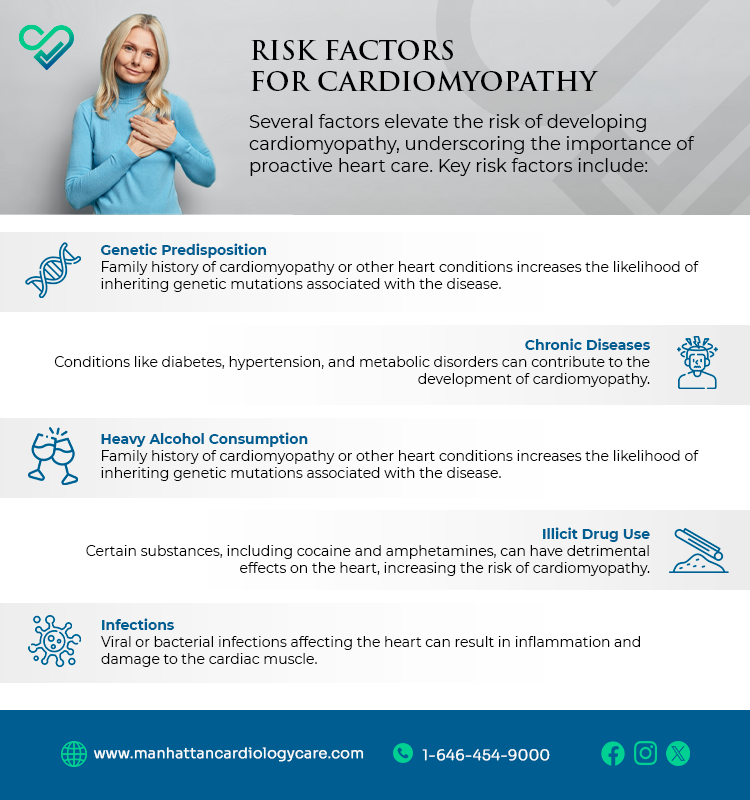Do you know a superhero? Silently working day and night to keep you going every single day? – That’s your heart, a powerful muscle with its own set of challenges.
In today’s blog, we will explain one of these challenges – Cardiomyopathy. Don’t let the big word scare you; it’s just a way your heart tells you it needs a little extra care.
So, let’s explore this together, Understanding Cardiomyopathy what it is, types of cardiomyopathy, symptoms, treatments, and everything else.
Table of contents
What is Cardiomyopathy?
Cardiomyopathy can be explained as a disease of the heart muscle, affecting its ability to pump blood efficiently. This condition doesn’t always stem from the usual suspects like high blood pressure or blocked arteries. Instead, it encompasses a range of disorders, each with its unique characteristics.
Types of Cardiomyopathy
Cardiomyopathy manifests in several distinct forms, each presenting unique challenges to heart health. Here are the main types of cardiomyopathy:
Hypertrophic Cardiomyopathy (HCM): Characterized by thickening of the heart muscle, particularly the left ventricle, Hypertrophic Cardiomyopathy can impede blood flow and lead to irregular heartbeats.
Dilated Cardiomyopathy (DCM): In Dilated Cardiomyopathy, the heart chambers become enlarged, weakening the muscle and diminishing its pumping ability. This can result in heart failure.
Restrictive Cardiomyopathy (RCM): RCM involves stiffening of the heart muscle, restricting its ability to expand and fill with blood. This stiffness hampers proper cardiac function.
Arrhythmogenic Right Ventricular Dysplasia (ARVD): ARVD is characterized by the replacement of heart muscle with fibrous tissue, impacting the heart’s electrical signaling and increasing the risk of dangerous arrhythmias.
Symptoms of Cardiomyopathy
Cardiomyopathy manifests through a range of symptoms, serving as vital indicators for timely intervention. These symptoms of cardiomyopathy may include:
Fatigue: Persistent tiredness and a lack of energy, even with minimal exertion.
Shortness of Breath: Difficulty breathing, particularly during physical activity or when lying down.
Swelling (Edema): Accumulation of fluid in the legs, ankles, or abdomen due to compromised circulation.
Irregular Heartbeats: Palpitations, fluttering, or a sense of the heart racing, signaling potential arrhythmias.
Chest Discomfort: Unexplained chest pain or discomfort, often indicative of compromised blood flow to the heart muscle.
How Common is Cardiomyopathy?
Cardiomyopathy is a prevalent heart condition cardiovascular condition with a significant global impact. It affects individuals across diverse demographics, demonstrating that it is not a rare occurrence. The incidence varies among different types of cardiomyopathy, and while it can manifest at any age, certain types may be more prevalent in specific age groups. The potential for under diagnosis emphasizes the importance of increased awareness, routine screenings, and proactive heart health measures to improve early detection and optimize cardiomyopathy treatment outcomes.
What Causes Cardiomyopathy?
Cardiomyopathy has diverse origins, stemming from a variety of factors. Some key contributors include:
Genetics: Inherited genetic mutations can predispose individuals to certain types of cardiomyopathy, emphasizing the importance of understanding family medical history.
Infections: Viral infections, especially those affecting the heart, can lead to inflammation and damage to the cardiac muscle.
Autoimmune Conditions: Disorders where the immune system mistakenly attacks the heart muscle, such as lupus or rheumatoid arthritis, can contribute to cardiomyopathy.
Heavy Alcohol Use: Excessive and prolonged alcohol consumption can weaken the heart muscle, leading to alcoholic cardiomyopathy.
High Blood Pressure: Persistent hypertension forces the heart to work harder, potentially leading to hypertrophic cardiomyopathy.
Diabetes: Uncontrolled diabetes can contribute to the development of dilated cardiomyopathy over time.
Risk Factors for Cardiomyopathy
Several factors elevate the risk of developing cardiomyopathy, underscoring the importance of proactive heart care. Key risk factors include:
Genetic Predisposition: Family history of cardiomyopathy or other heart conditions increases the likelihood of inheriting genetic mutations associated with the disease.
Chronic Diseases: Conditions like diabetes, hypertension, and metabolic disorders can contribute to the development of cardiomyopathy.
Heavy Alcohol Consumption: Excessive and prolonged alcohol intake can weaken the heart muscle, leading to alcoholic cardiomyopathy.
Illicit Drug Use: Certain substances, including cocaine and amphetamines, can have detrimental effects on the heart, increasing the risk of cardiomyopathy.
Infections: Viral or bacterial infections affecting the heart can result in inflammation and damage to the cardiac muscle.
Cardiomyopathy Treatment
There are diverse cardiomyopathy treatment options, aiming to alleviate symptoms, improve heart function, and enhance overall quality of life.
Key cardiomyopathy treatment modalities include:
Medications: Prescription drugs, such as beta-blockers, ACE inhibitors, or diuretics, may be prescribed to manage symptoms of cardiomyopathy, regulate blood pressure, and reduce the workload on the heart.
Lifestyle Modifications: Adopting a heart-healthy lifestyle, including regular exercise, a balanced diet, and abstaining from alcohol and illicit drugs, plays a pivotal role in managing cardiomyopathy.
Device Therapy: In some cases, devices like pacemakers or implantable cardioverter-defibrillators (ICDs) may be recommended to regulate heart rhythm and prevent life-threatening arrhythmias.
Surgery: Surgical interventions, such as heart valve repair or heart transplant, may be considered in severe cases or when other treatments prove insufficient.
Frequently Asked Questions
What not to do when you have cardiomyopathy?
Avoid heavy alcohol consumption, ignore medications, and neglect a heart-healthy lifestyle. Consult your healthcare provider for specific guidance.
Can your heart recover from cardiomyopathy?
Recovery depends on the type and severity. With proper treatment, lifestyle changes, and monitoring, some cases show improvement, while others may require ongoing management.
What is the life expectancy of a person with cardiomyopathy?
Life expectancy varies based on the type, severity, and individual factors. Timely diagnosis, effective treatment, and a healthy lifestyle can positively influence outcomes.
Is cardiomyopathy life-threatening?
In severe cases, cardiomyopathy can be life-threatening. Early diagnosis and appropriate management are crucial for improving prognosis.
What is end stage cardiomyopathy?
End-stage cardiomyopathy refers to the advanced phase where the heart's pumping ability is significantly compromised. It often requires advanced cardiomyopathy treatments, such as heart transplant or other interventions.
Is walking good for cardiomyopathy?
Yes, moderate exercise like walking can be beneficial for cardiomyopathy patients. However, it's crucial to consult with a healthcare provider to determine the appropriate level of activity.
What triggers cardiomyopathy?
Various factors can trigger cardiomyopathy, including genetic predisposition, infections, chronic diseases, excessive alcohol use, and certain drugs. Identifying and managing these triggers is essential for prevention.
– Disclaimer –
This blog is for informational & educational purposes only, and does not intend to substitute any professional medical advice or consultation. For any health related concerns, please consult with your physician, or call 911.


